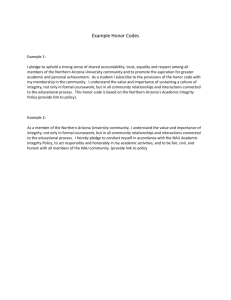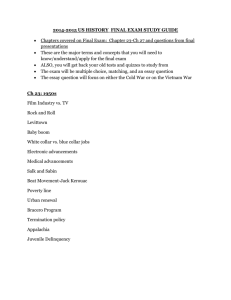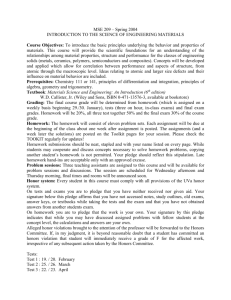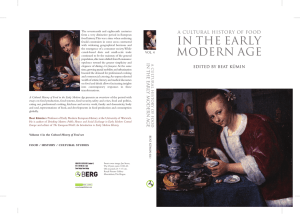– Unit 12, Chapter 38 (13 Ed.)
advertisement
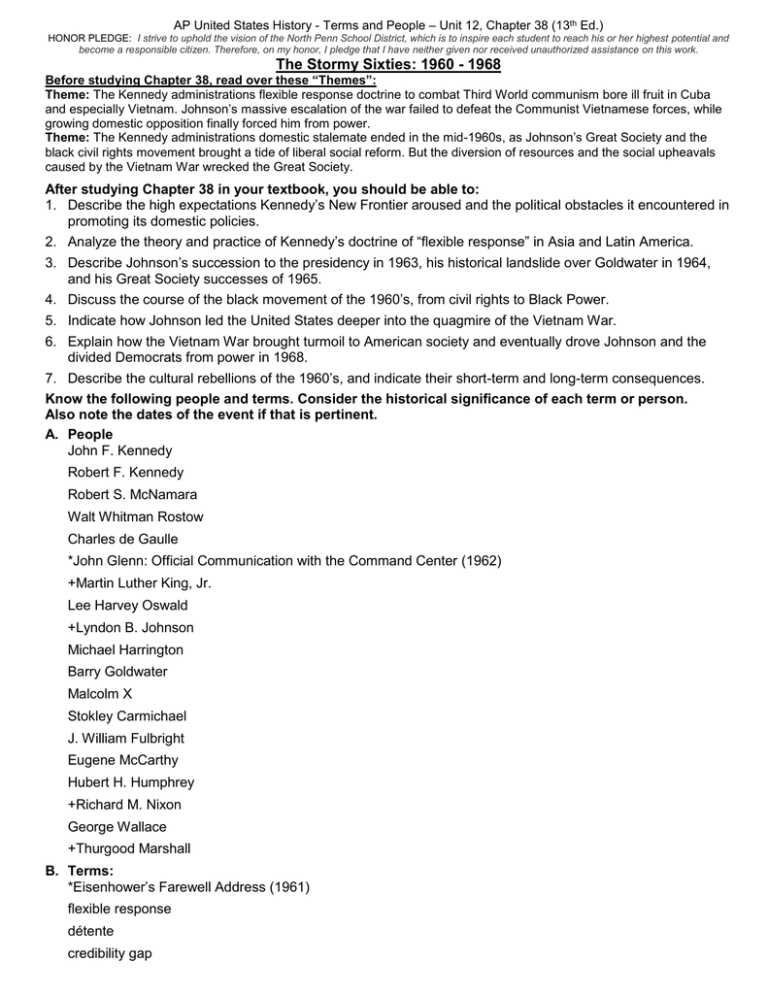
AP United States History - Terms and People – Unit 12, Chapter 38 (13th Ed.) HONOR PLEDGE: I strive to uphold the vision of the North Penn School District, which is to inspire each student to reach his or her highest potential and become a responsible citizen. Therefore, on my honor, I pledge that I have neither given nor received unauthorized assistance on this work. The Stormy Sixties: 1960 - 1968 Before studying Chapter 38, read over these “Themes”: Theme: The Kennedy administrations flexible response doctrine to combat Third World communism bore ill fruit in Cuba and especially Vietnam. Johnson’s massive escalation of the war failed to defeat the Communist Vietnamese forces, while growing domestic opposition finally forced him from power. Theme: The Kennedy administrations domestic stalemate ended in the mid-1960s, as Johnson’s Great Society and the black civil rights movement brought a tide of liberal social reform. But the diversion of resources and the social upheavals caused by the Vietnam War wrecked the Great Society. After studying Chapter 38 in your textbook, you should be able to: 1. Describe the high expectations Kennedy’s New Frontier aroused and the political obstacles it encountered in promoting its domestic policies. 2. Analyze the theory and practice of Kennedy’s doctrine of “flexible response” in Asia and Latin America. 3. Describe Johnson’s succession to the presidency in 1963, his historical landslide over Goldwater in 1964, and his Great Society successes of 1965. 4. Discuss the course of the black movement of the 1960’s, from civil rights to Black Power. 5. Indicate how Johnson led the United States deeper into the quagmire of the Vietnam War. 6. Explain how the Vietnam War brought turmoil to American society and eventually drove Johnson and the divided Democrats from power in 1968. 7. Describe the cultural rebellions of the 1960’s, and indicate their short-term and long-term consequences. Know the following people and terms. Consider the historical significance of each term or person. Also note the dates of the event if that is pertinent. A. People John F. Kennedy Robert F. Kennedy Robert S. McNamara Walt Whitman Rostow Charles de Gaulle *John Glenn: Official Communication with the Command Center (1962) +Martin Luther King, Jr. Lee Harvey Oswald +Lyndon B. Johnson Michael Harrington Barry Goldwater Malcolm X Stokley Carmichael J. William Fulbright Eugene McCarthy Hubert H. Humphrey +Richard M. Nixon George Wallace +Thurgood Marshall B. Terms: *Eisenhower’s Farewell Address (1961) flexible response détente credibility gap AP United States History - Terms and People – Unit 12, Chapter 38 (13th Ed.) HONOR PLEDGE: I strive to uphold the vision of the North Penn School District, which is to inspire each student to reach his or her highest potential and become a responsible citizen. Therefore, on my honor, I pledge that I have neither given nor received unauthorized assistance on this work. New Frontier *Executive Order 10924: Peace Corps (1961) Vienna summit Trade Expansion Act Viet Cong Alliance for Progress Bay of Pigs War on Poverty Great Society *Tonkin Gulf Resolution (1964) *Civil Rights Act of 1964 Cuban missile crisis - *aerial photographs of missiles in Cuba (1962) *nuclear Test Ban Treaty (1963) March on Washington - *official program (1963) *Social Security Act Amendments (1965) *Voting Rights Act (1965) Twenty-fourth amendment Operation Rolling Thunder Pueblo incident Tet offensive counterculture “black power” Six-Day War ‘hawks” and “doves” “Beat Generation” poets Free Speech Movement Students for a Democratic Society (SDS) +=One of the 100 Most Influential Americans of All Time, as ranked by The Atlantic. Go to Webpage to see all 100. *=A 100 Milestone Document from the National Archive. Go to Webpage to link to these documents. C. Sample Essay: Using what you have previously learned and what you reading Chapter 38, you should be able to answer essays such as these: 1. The civil rights movement of the 1960’s often called the “Second Reconstruction.” Assess the validity of this statement. 2. To what extent did the Vietnam War, and the domestic opposition to it, come to dominate American politics in the 1960s? D. Voices from the past: “We make movies about Malcolm X, we get a holiday to honor Dr. Martin Luther King, but every day we live the legacy of Justice Thurgood Marshall.” Washington Afro-American editorial after the death of Thurgood Marshall “. . . And so, my fellow Americans: ask not what your country can do for you – ask what you can do for your country.” *John F. Kennedy, in his inaugural address January 20, 1961 “I say to you today, my friends, that in spite of the difficulties and frustrations of the moment I still have a dream. It is a dream deeply rooted in the American dream. I have a dream that one day this nation will rise up and live out the true meaning of its creed: ‘We hold these truths to be self-evident; that all men are created equal.’ I have a dream. . . .” Martin Luther King, Jr., in his “I Have A Dream” speech in Washington, D.C. on August 28, 1963 AP United States History - Terms and People – Unit 12, Chapter 38 (13th Ed.) HONOR PLEDGE: I strive to uphold the vision of the North Penn School District, which is to inspire each student to reach his or her highest potential and become a responsible citizen. Therefore, on my honor, I pledge that I have neither given nor received unauthorized assistance on this work. The Beat Generation by Levi Asher / Sep 20, 2001 Like the French Impressionist artists of Paris, the Beat writers were a small group of close friends first, and a movement later. The term "Beat Generation" gradually came to represent an entire period in time, but the entire original Beat Generation in literature was small enough to have fit into a couple of cars (at times this nearly happened). The core group consisted of Jack Kerouac, Allen Ginsberg, Neal Cassady and William S. Burroughs, who met in the neighborhood surrounding Columbia University in uptown Manhattan in the mid40s. They picked up Gregory Corso in Greenwich Village and found Herbert Huncke hanging around Times Square. They then migrated to San Francisco where they expanded their group consciousness by meeting Gary Snyder, Lawrence Ferlinghetti, Michael McClure, Philip Whalen and Lew Welch. Most of them struggled for years to get published, and it is inspiring to learn how they managed to keep each other from giving up hope when it seemed their writings would never be understood. Their moment of fame began with a legendary poetry reading at the Six Gallery in San Francisco. After the first wave of Beat writers became famous, a second wave followed. Some later arrivals to the crowd include Bob Kaufman, Diane DiPrima, Ed Sanders, Anne Waldman, Ray Bremser and Ted Joans. The "latter day beats" added some much needed cultural diversity, as well as an infusion of new ideas and talent, to the core of white male friends that were the "classic beats". The ranks of legendary Beat poets continues to slowly evolve; recently more attention has been paid to other talented writers who had gathered at the fringes of earlier Beat scenes, including Charles Plymell, Jack Micheline, Herschel Silverman, Marty Matz, Ron Whitehead, Jim Carroll, Janine Pommy-Vega and countless others. The phrase "Beat Generation" was invented by Jack Kerouac in 1948. The phrase was introduced to the general public in 1952 when Kerouac's friend John Clellon Holmes wrote an article, 'This is the Beat Generation,' for the New York Times Magazine. E. Map work: Identify the countries referred to on the map below. 1. ____________________________________ 2. ____________________________________ 3. ____________________________________ 4. ____________________________________ 5. ____________________________________ 6. What is the name of the river coming out of #5 into #4? ______________________________________ 7. Name the body of water directly east of country 2: ____________________________ 8. Name the body of water directly east of country 4: _________________________________________ (See textbook page 914) OVER -> AP United States History - Terms and People – Unit 12, Chapter 38 (13th Ed.) HONOR PLEDGE: I strive to uphold the vision of the North Penn School District, which is to inspire each student to reach his or her highest potential and become a responsible citizen. Therefore, on my honor, I pledge that I have neither given nor received unauthorized assistance on this work. Southeast Asia During the Vietnam War China U.S. Withdrawal 1973
